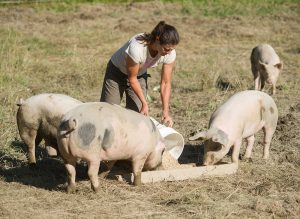Bulletin #1120, Family Health Considerations for Pig Owners: Swine Ascarids
By Anne Lichtenwalner, DVM Ph.D., University of Maine Cooperative Extension
For information about UMaine Extension programs and resources, visit extension.umaine.edu.
Find more of our publications and books at extension.umaine.edu/publications/.
Many farmers are thinking about integrating pigs into their farm, and many already raise pigs. Pigs are a great resource when clearing new areas for cultivation, and have become very popular for meat and value-added meat products. However, there are some important health considerations to keep in mind.
Most people understand the great importance of fully cooking pork products, due to the risk of transmission of parasites such as trichinella, which may be present within the muscles of the pig. It’s important to know that there are some other organisms that people can get from pig manure, even if it’s been well-composted. One of these is the pig ascarid (or roundworm, Ascaris suum).
In the pig, after this parasite is eaten, it undergoes a life cycle that includes movement (as larvae) from the pig’s intestine, through the lungs and liver, and back into the intestine, where these larvae mature into adults. As mature adult worms, the ascarids can produce fertile eggs that are shed in the pig’s manure (for a diagram of the life cycle, see Ascaris suum life cycle). These eggs can be eaten by earthworms and dung beetles. Pigs become infected by ingesting ascarid eggs directly from the soil, or by eating infected earthworms and dung beetles. If people ingest these ascarid eggs, experimental studies have shown that the larvae can migrate and develop into adult worms in human intestines just as they do within the pig. The roundworm of humans has also been shown to infect pigs.
Although human infection with the pig ascarid is very rarely life-threatening, it’s still a problem. From 2010 to 2013 in Maine, 14 cases of human infection with ascarids were identified in people who had contact with pigs1.
So it’s a good idea to be sure your pigs are worm-free. You can find out by having a pig fecal sample tested at the Cooperative Extension Veterinary Diagnostic Laboratory. We suggest doing this to see what kind of wormer you should use, then again after treating them with a wormer, just to be sure it worked. Keep pigs from reinfecting themselves with worms by keeping their pens clean, and feed from a trough. If keeping pigs longer than a few months, run a fecal test yearly to see if you need to repeat the worming treatment periodically.
What should you do with pig manure? You may want to create a separate compost system for it. If well-composted, the pig manure is fine for ornamental plants, but due to the risk of possible parasites, it shouldn’t be used for garden vegetables or be spread on land that will be used to pasture swine. See the University of Maine Cooperative Extension Bulletin #2510, Guidelines for Using Manure on Vegetable Gardens. Although composting is a wonderful way to reduce pathogens, it doesn’t necessarily kill very tough parasite eggs such as ascarids. Keep your pigs ascarids-free to protect pig and human health.
Reference:
1 Miller LA, Colby K, Manning SE, Hoenig D, McEvoy E, Montgomery S, et al. 2015. Ascariasis in humans and pigs on small-scale farms, Maine, USA, 2010–2013. Emerging Infectious Diseases 21 (2). http://dx.doi.org/10.3201/eid2102.140048
Information in this publication is provided purely for educational purposes. No responsibility is assumed for any problems associated with the use of products or services mentioned. No endorsement of products or companies is intended, nor is criticism of unnamed products or companies implied.
© 2018
Call 800.287.0274 (in Maine), or 207.581.3188, for information on publications and program offerings from University of Maine Cooperative Extension, or visit extension.umaine.edu.
The University of Maine System (the System) is an equal opportunity institution committed to fostering a nondiscriminatory environment and complying with all applicable nondiscrimination laws. Consistent with State and Federal law, the System does not discriminate on the basis of race, color, religion, sex, sexual orientation, transgender status, gender, gender identity or expression, ethnicity, national origin, citizenship status, familial status, ancestry, age, disability (physical or mental), genetic information, pregnancy, or veteran or military status in any aspect of its education, programs and activities, and employment. The System provides reasonable accommodations to qualified individuals with disabilities upon request. If you believe you have experienced discrimination or harassment, you are encouraged to contact the System Office of Equal Opportunity and Title IX Services at 5713 Chadbourne Hall, Room 412, Orono, ME 04469-5713, by calling 207.581.1226, or via TTY at 711 (Maine Relay System). For more information about Title IX or to file a complaint, please contact the UMS Title IX Coordinator at www.maine.edu/title-ix/.


